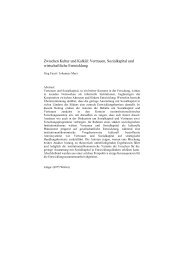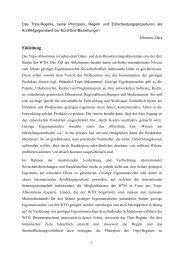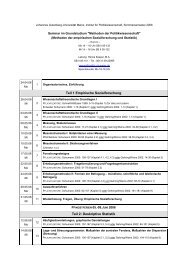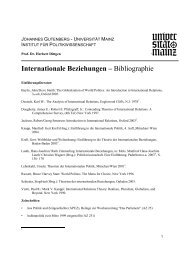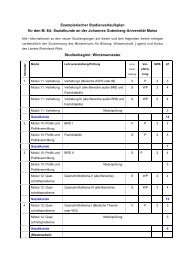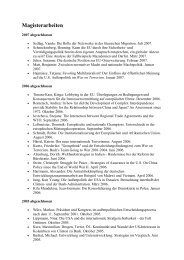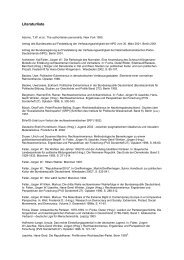Feedback Effects in Foreign Policy: A Framework for Analysis
Feedback Effects in Foreign Policy: A Framework for Analysis
Feedback Effects in Foreign Policy: A Framework for Analysis
Create successful ePaper yourself
Turn your PDF publications into a flip-book with our unique Google optimized e-Paper software.
its dom<strong>in</strong>ant position <strong>in</strong> the <strong>in</strong>ternational system the potential <strong>for</strong> un<strong>in</strong>tentional negative<br />
feedbacks is particularly high (e.g. Layne 1993, Waltz 1994).<br />
20<br />
There and back aga<strong>in</strong> III: Policies of others and <strong>for</strong>eign policy<br />
While the preced<strong>in</strong>g sub-sections have looked at how the broad structural environment of a<br />
state may <strong>in</strong>teract with this state's <strong>for</strong>eign policy, we will now turn to an aspect of the<br />
<strong>in</strong>ternational environment that is of a less general nature. Policies of other states obviously<br />
affect what a state can and will do <strong>in</strong> the <strong>in</strong>ternational system, but they do not necessarily<br />
<strong>for</strong>m macro-structures like the <strong>in</strong>ternational distribution of power or <strong>in</strong>ternational<br />
<strong>in</strong>stitutions. Nonetheless they have been subject to some theoretical attention and review<strong>in</strong>g<br />
this research will help us understand how the policies of other states may become <strong>in</strong>volved<br />
<strong>in</strong> a process of <strong>for</strong>eign policy feedbacks.<br />
There are, <strong>in</strong> particular, two strands of research that are of importance here. The most<br />
elaborate rationalist account of the effects of other states' policies comes from game theory<br />
(Kahler 1998); while <strong>in</strong>teractionist approaches present us with a constructivist read<strong>in</strong>g of<br />
these effects (Wendt 1992). To beg<strong>in</strong> with, game theory po<strong>in</strong>ts out that the preferences and<br />
policies of <strong>in</strong>teraction partners <strong>for</strong>m certa<strong>in</strong> micro-structures (situations) which affect the<br />
policy paths that are chosen by the actors. The most popular example, of course, is the<br />
Prisoners' Dilemma <strong>in</strong> which the constellation of preferences leads both <strong>in</strong>teraction partners<br />
to choose policies which create a suboptimal <strong>in</strong>teraction result <strong>for</strong> both of them. If the games<br />
are repeated changes <strong>in</strong> one actor's policies affect the calculation and ultimately the policies<br />
of the other actor. This is most obvious when the actors play tit-<strong>for</strong>-tat (Axelrod 1984), <strong>in</strong><br />
which both cooperative and uncooperative moves are answered by like moves from the<br />
<strong>in</strong>teraction partner. Tit-<strong>for</strong>-tat can then evolve <strong>in</strong>to an <strong>in</strong>stance of an (<strong>in</strong>tentional) positive<br />
feedback loop <strong>in</strong> which cooperation is reproduced and re<strong>in</strong><strong>for</strong>ced over time.<br />
Game theory thus conceives of others' policies primarily as constra<strong>in</strong>ts on one's own<br />
choices. They do not alter actors' preferences over ultimate outcomes but <strong>in</strong>fluence the<br />
policies they choose to achieve these outcomes. This con<strong>for</strong>ms with the basic thrust of many<br />
empirically-m<strong>in</strong>ded <strong>for</strong>eign policy analyses, which represent <strong>for</strong>eign policies as responses to<br />
the actions of others without further reflection on theory, e.g. negotiations between the U.S.<br />
and North Korea, which may be recounted simply as a cha<strong>in</strong> of actions and reactions by the<br />
two parties.




